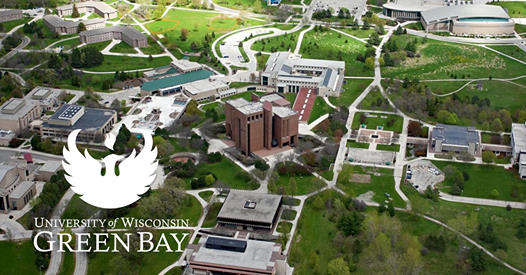
UW-Green Bay Receives $275,402 to Train Next Generation of Water Scientists
Green Bay, Wis—The University of Wisconsin-Green Bay will receive $275,402 in support from the Freshwater Collaborative of Wisconsin this year to enhance its water-related academic programs.
The funding is part of a statewide initiative, backed by the Wisconsin State Legislature and the Governor’s office, to tackle 10 grand water challenges and support curriculum development, undergraduate research opportunities, career development, and field-training experiences for students interested in studying water-related fields at the 13 UW Schools.
Funding includes support for the following projects at UW-Green Bay:
$9,843 Course Development, “Human Interactions with Lake Michigan Coastal Ecosystems
(Joint UW-Green Bay, UW-Parkside and UW-Milwaukee)
$72,338 UW-Green Bay Career Development
(Freshwater Collaborative Student Internships through Collaborative Partnerships)
$193,221 UW-Green Bay Student Experience
(Educators and Students Rise to Freshwater Challenges)
$275,402 Total
“These projects will attract, prepare and train students to address freshwater challenges in Northeast Wisconsin and throughout the state,” said professor and researcher Kevin Fermanich, the campus Freshwater Collaborative Steering Committee member. “This investment in the UW System Freshwater Collaborative lays the foundation for our students and communities to connect with and learn from water experts and students across the UW System. Although these initial projects target students and educators from communities stretching from Marinette to Sheboygan, I’m really excited about making connections to water programs across the UW System via the Freshwater Collaborative.”
Overall, the Freshwater Collaborative of Wisconsin will support 42 grants to further develop UW System-wide water science programs, internships and research opportunities. High school and undergraduate students will have opportunities to participate in hands-on field and research experiences with faculty throughout the state, allowing them to develop a diverse range of skills. The Collaborative is also partnering with industry, nonprofits and community organizations to increase career development opportunities for students. Grant descriptions available at freshwater.wisconsin.edu.
About the Freshwater Collaborative
The Freshwater Collaborative of Wisconsin is a partnership of Wisconsin’s 13 public universities, connecting with industry partners, local communities, policymakers and advocacy groups. Its mission is to establish Wisconsin as a world leader in freshwater science, technology, entrepreneurship and economic growth. The Freshwater Collaborative of Wisconsin is training the next generation of scientists to solve global water resource problems through academic programs, collaborative research and career development across the UW System.

